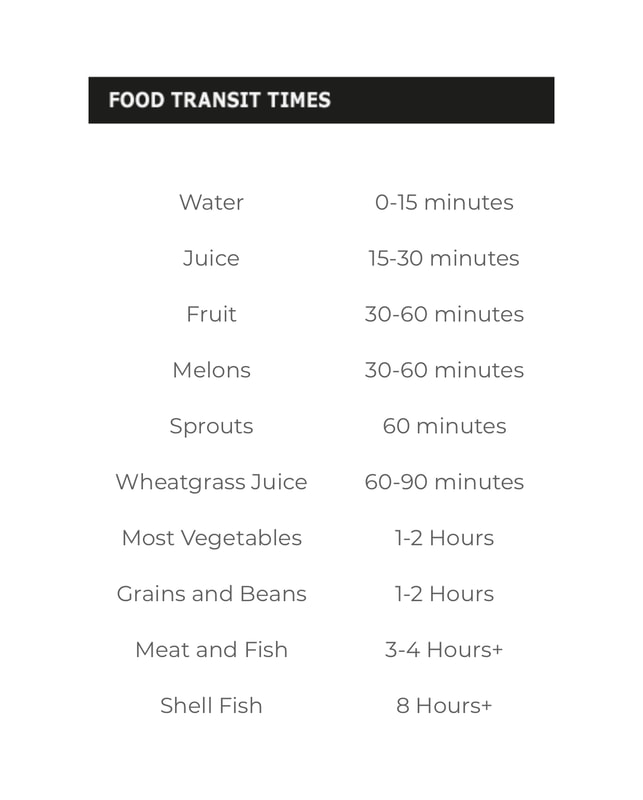|
Written by Eric Morris Jr, CPT, Pn1 We’ve all been there- you eat something, you bloat and feel terrible. It’s not sexy and its’s not fun, but it happens. Digestive issues are difficult to deal with but they can be overcome. They can be complicated due to our modern and unnatural lifestyles, diets, environments and modern agriculture. Our soils are depleted of not only minerals, but also of the microbial diversity that would otherwise make our food more nutritious allowing us to digest a wide variety of foods. On top of this, our food is grown and sprayed with toxic chemicals that break down the lining of our guts thereby inhibiting our ability to digest what we eat. These chemicals and practices not only cause digestive issues but also lead to cancer, depression and other physical and mental health issues. There’s a number of things we can do or address to help our bodies in digesting the food we eat and reduce the prevalent problem of gas, bloating and digestive distress. LIMIT FAT: Not everyone can tolerate high amounts of fat. Even if you can there’s still a threshold which can vary from person to person. If you eat more fat in a meal than your body can handle it can cause gas and bloating due to irritation and inflammation of the gallbladder. You do need the right amount, however. Ten grams of fat seems to be the optimal amount of fat to stimulate bile secretion by the gallbladder and fully empty it and keep it exercised [11]. Letting bile sit and accumulate in the gallbladder can result in unhealthy thick bile sludge and gall stones. Aim for about ten grams of healthy fat per meal and adjust accordingly based on your body’s reaction. If you need to reduce the amount, try to reduce it by about 2 or 3 grams and see how you fair. If you’re on a high fat diet you might want to look into taking lipase enzyme with your meals to assist in breaking down the fat. When the gallbladder is inflamed, it also irritates the phrenic nerve. Your phrenic nerve goes from the abdomen, through the chest, and into the neck. When you eat a meal that’s too fatty, it puts pressure on this nerve and causes referred pain in your right shoulder. This can also cause headaches. Dr. Eric Berg has an insightful video on a big fatty meal, bloating and the effect on the phrenic nerve. LIMIT WATER DURING MEALS: Drinking too much water during meals has the effect of diluting stomach acid which can impair digestion leading to gas and bloating. Too much water in general can cause you to pee too often, which causes you to lose sodium and water. Your body then compensates by retaining more water. Drinking too fast alone can also have this effect. MAINTAIN MINERAL BALANCE: If you're not taking in enough water your body will cause you to hold on to water in compensation and you will bloat. Facial bloating in particular is one of the last signs that you’re dehydrated. It’s a last ditch effort by your body to retain water and minerals to stay hydrated. Mineral loss, which comes along with dehydration, is one big reason your body is retaining water. It’s an attempt to keep the minerals that are supposed to be in your water such as sodium and magnesium. Magnesium is another mineral in which a deficiency will also lead to water retention and facial bloating, especially in women [7]. Magnesium deficiency can also lead to Type 2 diabetes [8], heart disease, bone disease and chronic fatigue. LIMIT CAFFEINE: For the same reasons too much or too little water can cause you to bloat, caffeine can cause you to bloat as well. Caffeine can serve as a diuretic and cause you to urinate frequently. However, according to healthline.com in order for coffee to make you lose more water than you consume (which is what happens in dehydration) you would have to drink about 5 cups (40 oz or 1.2 liters) of coffee per day (which some people actually do) for this to happen. So just be cognizant and keep it reasonable. WATCH SODIUM LEVELS: Too much sodium (hypernatremia) causes you to retain more water to dilute all that sodium in your blood. Mineral balance is very delicate. According to the American Heart Association, we should be consuming less than 2,300 mg of sodium per day with and ideal amount of 1,500 mg per day [3]. On average, Americans consume more than 3,400 mg per day. On the flip side, insufficient sodium (hyponatremia) can be just as harmful, if not more. Although not as common of a condition, too little sodium in your blood can cause headaches, nausea, vomiting, lethargy, low energy, cognitive impairment such as confusion, cramping, muscle weakness, irritability, restlessness and bloating [9, 10]. MANY TYPES OF FOOD AT ONE MEAL: Too Many different types of food at one meal is hard to digest because different types of food require different enzymes and different environments (stomach PH). You may overwhelm the stomach and its ability to release so many types of enzymes required to digest the entire meal. Different foods also have different transit times. For instance, fruit digests the fastest while protein and fat take much longer. For example, if you eat a steak and a piece of fruit in the same meal, the meat will impair the digestion of the fruit at the appropriate rate and the fruit will sit and rot in the gut instead of rapidly digesting as it normally would when eaten alone or with compatible foods. If your digestive system is not compromised in any way you may be able to handle all those different types of food at one meal, but the majority of the population has some degree of weakened digestion by virtue of our food supply, lifestyle and stress levels. Eating foods that have similar digestion rates can relieve an incredible amount of strain on our systems and lessen or eliminate the unpleasant symptoms that come with that. Food combining can be a deep dive. You can check out a good resource on the topic here in addition to this helpful chart on food transit times. *Courtesy of advancedrejuvenation.us DO NOT OVEREAT: Eating too much in general (even of one type of food) overburdens the stomach and enzymes needed to digest your food. Eating too fast can also cause you to overeat due to your body not having enough time to signal that you’re full. Overeating caused by eating too fast can also cause you not to chew your food well which puts more strain on your digestive system. Eat slowly, mindfully and just until satisfied, not until you’re stuffed. LOW STOMACH ACID: Low stomach acid (hypochlorhydria) means you don’t have the proper hydrochloric acid levels necessary to break down your food. This could be due to age, vitamin deficiency (zinc or B vitamins), medications or stress. Eating too quickly can also weaken or suppress stomach acid. Apple Cider Vinegar, Betaine HCL and/or digestive enzymes can help with this. Drinking celery juice can also help rebuild stomach acid. Putting some sea salt on your food can help support stomach acid since chloride in salt (sodium chloride) contributes to the chloride present in stomach acid (hydrochloric acid). LIMIT ALLERGENIC FOODS: Gluten, dairy (lactose, casein), refined sugar, sugar alcohols and artificial sweeteners processed carbohydrates, grains, and GMO corn and soy are among the most problematic and allergenic foods for a large segment of the population. These foods are hard to digest and can cause leaky gut (gaps in the gut lining), poor nutrient absorption, gas and bloating. ADDRESS PARASITES: Most people have parasites to some degree. They’re easy to contract through raw, undercooked or contaminated food. A small amount may not be an issue, but if it’s a certain type or a high amount then that can certainly be problematic and can wreak havoc on your body. There are a number of herbal remedies and medications that can get rid of them if you test positive for parasites or believe you have them. CONSIDER H. PYLORI: This bacteria that also acts as a parasite is a cause of stomach ulcers [5,6] that can lead to cancer. If present, symptoms include stomach pain, indigestion, gas and bloating. Just like parasites, you can get H. Pylori from undercooked or raw meat and seafood (sushi is a big offender- be sure to eat the ginger served with it as it will help kill any possible parasites or bacteria), and unwashed or contaminated food. Having strong stomach acid can also kill parasites and harmful bacteria like H. Pylori. There are antibiotics and certain probiotics, such as lactobicillus reuteri, that can help treat an H. Pylori infection [1]. You may need to take antibiotics but it is advised to look into a natural route to avoid killing off your good bacteria needed for optimal gut health. If you do need to rebuild your good bacteria because of antibiotics, then prebiotics can definitely help. We’ll talk more about prebiotics in the section on fasting. MANAGE STRESS: Stress shuts down digestion and puts you into a sympathetic (flight or fight) mode and can cause a cascade of bodily consequences including hormone imbalance, weight gain, weight loss, indigestion, and water retention. A number of these effects can then cause, you guessed it, bloating. Practice deep breathing, prayer and meditation, walking, not eating when you're upset, anxious, worried, rushed or otherwise stressed out. TRY FASTING: Fasting (refraining from eating for long periods of time) is a great practice and should be done periodically and responsibly. One day a week or 2-3 days intermittently is fine for most people. Longer periods may be helpful if you’re addressing a condition or illness where it's warranted or helpful. When we fast we eliminate bad bugs in our system, which is beneficial. However, we can also eliminate good bacteria in our gut which we need for proper digestion. If this happens, a good thing to do is reintroduce good bacteria in your gut by consuming probiotics and prebiotic rich foods. Fermented foods such as sauerkraut, kimchi, kombucha and kefir can be beneficial at rebuilding good gut flora. Be mindful of any reaction as some fermented foods can be allergenic to some individuals and cause a histamine reaction. Some people react and are sensitive to histamine and other amines. They may experience headaches after consuming fermented food. This happens because amines stimulate the central nervous system, increasing or decreasing blood flow, which can cause headaches and migraines [4]. If this happens, you may want to stick with probiotic supplements or find out which fermented foods you can tolerate. Prebiotics (resistant starch) feed your good bacteria and are fantastic to consume on a regular basis. Prebiotics may be even more important than probiotics as they’re not only what feeds your good bacteria, but also prevents the overgrowth of bad bacteria. You can grow a good bacteria population in your gut by just consuming food with prebiotic fiber even without probiotics. Prebiotic foods include garlic, onions, asparagus, green bananas, oats, apples, barley, cocoa, flaxseed, yacon root and seaweed. Starchy foods such as rice, potatoes and sweet potatoes produce large amounts of resistant starch when they’re cooked and cooled. If you’re not used to a lot of fiber in your diet then you need to increase it slowly. Working with a nutritionist or dietician can be helpful. PREVENT CONSTIPATION: If you’re not keeping things moving the sewage line will get backed up- your colon will get filled, gases will start to build up and you will feel heavy and may notice distention of the gut. Get the right amount of fiber, eat the right type of foods that you know you can digest (a food log/journal can greatly help), limit processed foods, eat slowly, get exercise and stay in motion, drink water and reduce your stress. All of this can help keep you regular. GET MOVING: Make sure you’re getting enough exercise and movement throughout the day. Movement affects digestion and gut motility, as well as how your body processes nutrients and how much fat you store. Include a mix of anaerobic (resistance or weight training) and aerobic (cardiovascular training such as running, swimming, hiking or walking) about three times per week. Try to go for at least a 10-15 minute walk after eating. You don’t want to do a full workout session or very strenuous activity right after a meal as this can hinder digestions and cause bloating or an upset stomach. Light to moderate movement is all you need- a post prandial walk or even household chores is highly beneficial. This kind of movement after eating improves not only digestion, but circulation and oxygenation as well. PUSH PLANT DIVERSITY: There is quite a discussion to be had on bloating and eating a diet full of fiber. Fiber is absolutely key to a healthy gut, normal digestion and managing bloating. If you’re not used to a lot of fiber in your diet or have been accustomed to the SAD (Standard American Diet) lacking in an abundance of plants and eating heavily processed and refined grains, then introduce a diverse array of plants slowly and over time so your system can handle it. It also comes down to focusing mostly on the right type of fiber: resistant starch or prebiotic fiber feeds good bacteria and produces a chemical compound called butyrate in your gut. Butyrate is a short chain fatty acid that promotes gut healing and is found in resistant starch and fiber rich foods. Butyrate can be produced by the following types of foods:
Do you see how variety and diversity are crucial for gut and total body health? Just like we need microbial diversity in our soil to grow nutrient rich crops, we also need diversity in our diet to have microbial diversity in our guts to have healthy digestion and the ability to extract all the nutrition and goodness from our foods. When we have bloating issues we need to eat the right foods consistently over time and with as much variety as possible. Try to implement some of these suggestions laid out here. Take your time and remember that knowledge is power, everyone is unique and intuition is key. Happy eating! Sources:
0 Comments
|
Details
|


